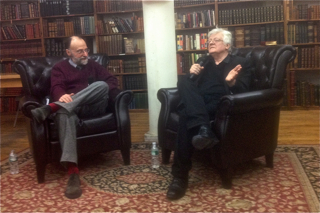He’s right to be delighted because Peter Schjeldhal’s review sets the stage for the book’s reception. Despite his moralistic assessment of William S. Burroughs, life and literary product both, Schjeldhal gives the rest of the mainstream media permission to recognize Miles’s monumental achievement. And on the higher slopes of Parnassus they will be obliged to. The more resentful will put their oar in with short snubs. The more thoughtful will give it some serious space, probably for Burroughs takedowns mixed with sighs of adoration. Not unlike Schjeldhal’s.
Some critics, including Miles, have tried to gussy up Burroughs’s antinomian morality as Swiftian satire. Burroughs, however, wages literary war not on perceptible real-world targets but against suggestions that anyone is responsible for anything. Though never cruel in his personal conduct, he was, in principle, exasperated with values of constraint. A little of “Nothing is true, everything is permitted” goes a long way for many readers, including me. But there’s no gainsaying a splendor as berserk as that of a Hieronymus Bosch painting. When you have read Burroughs, at whatever length suffices for you, one flank of your imagination of human possibility will be covered for good and all.
Despite its moralizing, the review is entertaining to read — something on the order of “a WSB Wikipedia entry retold by PS,” as a friend put it. Schjeldhal is good at turning a phrase, and his tone of sober assessment (judicious-sounding conclusions in disguise) at least allows Miles to come in for praise. Schjeldhal admires his prose, (“always efficient, often elegant”), if not the sunless Burroughsian netherworld that Call Me Burroughs necessarily excavates. He describes the biography as “rather like an odyssey by subway in the confines of Burroughs’s self-absorption,” but he clearly respects the awesome amount of research Miles has done. He should. Without Miles’s research to lean on, the review would be much less interesting.
One thing Schjeldhal does not get around to is Miles’s take on one of the keys to Burroughs’s personality, which Miles mentioned in his talk last night at the Strand. Burroughs, he pointed out, was a chameleon. He had many masks, and each was designed to fit whatever set he found himself in. So, for example, when Burroughs was among British toffs, he presented himself as properly upper class; and when he was among American rednecks, he dressed and sounded like a cracker. That goes a long way to explaining why Burroughs’s reputation as “el hombre invisible” doesn’t just apply to his notorious years as a desperate junky in Tangier, where he got the reputation in the first place. It applies to his entire life. Even when he became a cultural celebrity and reluctantly cashed in on his iconic status to pay the rent, he was hiding in plain sight. But his many masks could not — did not — hide him from the “Ugly Spirit,” which he believed had taken possession of him. It pursued him always.Postscript: Speaking of Burroughs …

!['Call Me Burroughs -- A LIfe' by Barry Miles [TWELVE Books, 2014]](http://www.artsjournal.com/herman/wp/wp-content/uploads/2014/01/call-me-burroughs-a-life-240.jpg)


The ethos of Burroughs and the Beats was first and foremost moral, which makes Peter Schjeldhal’s moralizing ironic in way. Through humor and self-irony Burroughs defined and analyzed society’s ills to a point that was almost medical — or so it seems to my uneducated mind. By living the opposite of given truths, Burroughs defined and studied our hypocrisy.
On the other hand, Burroughs did things so stupid it’s hard to forgive him. So we end up with Schjeldhal moralizing the moralizer. From a literary view Burroughs moralizes with a lot more style and insight. Still, I just can’t get around Burroughs shooting his wife in the head in an act of arty bravura and subjecting his child to abuse. I find myself just wanting to say fuck artiness, even if I don’t like Schjeldhal’s pat, yuppie perspective either. Options run out.
You’re absolutely right: Burroughs’s behavior was contemptible. He not only shot and killed his wife Joan in a drunken stupor, he was a terrible father to his son Billy. There’s no reason to forgive him. Although Burroughs truly believed in a “magical” universe in which an “Ugly Spirit” made him do terrible things, it seems clear he never forgave himself either.
I don’t know much about Burroughs and his work, but sometimes I get the feeling he not only never forgave himself, but that he was always a kind of dead man or talking ghost after that. Memories of Joan and profound remorse seem to be between every line he wrote.